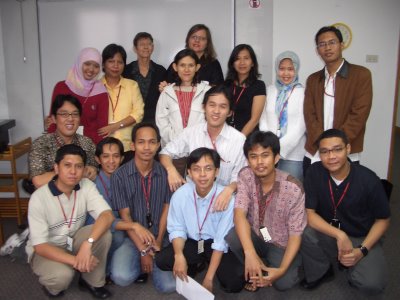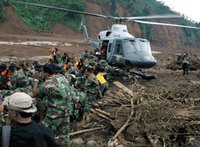
“…. At least you can celebrate Eid-Al Adha in your home country …” Ups … so relieved and encouraged me to explore about the ceremony. What does lie behind the annual ritual? A day after, I spent a few minutes browsing internet to find out the answer. Although I’ve been equipped with much dogma based on my religion’s tenets, it was interesting to seek other opinions regarding the reason why, what lessons are to get, what messages are to deliver, and what spirit encourages. Surprisingly, there are many isms of thought related to those questions. More surprisingly (I remember one of my friends’ writing style), those opinions vary and different enough to sprout up my willingness to explore more, … at least to read.
Marlan (www.waspada.co.id) ‘conservatively’ states that qurban literally comes from Arabic word quraba which means near, close by, so that this act of devotion is aimed to near ourselves to God by testing our willingness to sacrifice our precious belonging. He also says that qurban has two dimensions, i.e. vertical and horizontal. In the former dimension, it’s about our relation with God and in the later, qurban ends in the social earnest.
On the other hand, there are two articles about qurban that are interesting to share. Irwan (www.irwan.web1000.com) suggests that slaughtering Ismail by Prophet Ibrahim should be assumed as a kind of metaphoric verse and it didn’t really happen. Otherwise, there are two awkwardness as follows :
1. Killing people is a forbidden action. Is it possible if God tested his prophet with a forbidden action which God absolutely prohibit it?
2. Sacrificing Ismail meant that God has ignored Ismail’s existence and made him only as an object. It looked that God has disregarded Ismail’s independency as a creature. A strange God, isn’t it? If the event is aimed to test Ismail, it’s still questionable due to the 1st reason.
Moreover, Irwan concludes that Ismail slaughtering story was created by Prophet Ibrahim (based on God’s commandment) as critics and correction to pagans’ habits in sacrificing human blood for their God(s). Here, Ibrahim actually shown that God doesn’t need human blood or flesh, but human’s good intent.
In a further exploration, Zulfan (http://islamlib.com) reveals that our common understandings about the lessons behind the ceremony are only textual comprehension which doesn’t fit with recent condition anymore. Our social earnest will never be reached if we just interpret qurban as a livestock sacrificing. More acceptable if we use qurban as a media to eliminate poverty so that we are allowed change the object of that event. If the qurban’s object is still sheep, goat, cow, or other similar kind of animal, the impact of qurban will be forgotten immediately after the ceremony ends, and it will not leave a beneficial effect, especially for eradicating poverty. As a result, we are likely to be trapped in only an annual routine ritual. In addition, he states that we should change our mindset and understand that the essence of qurban is sacrificing our most precious asset, such as money.
Those are interesting, aren’t those? It is more interesting when Zulfan supposes to reengineer the ‘procedure’ of qurban, particularly related to kemaslahatan umat purpose (Argh .. I’m tired to seek the best English words for these terms).
I absolutely agree with Soekarno’s jargon : catch the fire of Islam, don’t just catch the ashes. But for me, catch the fire can’t be separated from other related aspects which flame the fire. Islam obliges its disciples being rich because a Moslem is demanded to conduct zakat, shodaqoh, infaq, qurban, hajj, and other charity actions that undeniably need capital. Furthermore, to help other Moslems give up from their poverty, Islam has many ways in how we should manage our economy in order to increase their social condition.
In relation with that, in my opinion, getting qurban with certain livestock and in the certain time is not merely textual comprehension, if we can understand the essence. ‘Procedure’ of qurban is rukun of our personal service to God, meanwhile in the same time, we are compelled to catch the fire to apply in our social interaction for kemasalahatan umat. In this case, emerging qurban in different form, such as by replacing stock with other things due to reason of eradicating poverty, is a bener tapi ora pener decision. Besides losing the rukun, that action even narrows our comprehension of Islam. It is a different story if Islam doesn’t give other ways to eradicate poverty (except qurban). Are there zakat, infaq, shodaqoh, and so on which can be empowered?
My own more acceptable conclusion is, till now, placing my self as homo simbolicum so that I voluntarily accept the ritual as symbolism and I am not encouraged to change the ‘procedure’ of qurban, hajj, or even sholat as my personal relation manifestation with my God. Why does Islam oblige its disciples to jengkang-jengking 5 times a day if we are allowed only to catch the fire, the spirit, namely iman to God? Why do we perform even some tiring rituals in hajj which are often dangerous because of human crowd? My answer is I don’t know or I haven’t known. Human being is limited creature who is impossible to know everything. Islam teaches human to use their intelligence but human should realize that it is impossible to use their limited intellect to interpret unlimited God’s commandments. For me, it’s safer being a kind of man who knows his unknown than being man who feels know in his unknown. The former will encourage us to seek continuously in the allowable border, while the later will grow our curiosity with unlimited questions and answers. Wallohu alam.




